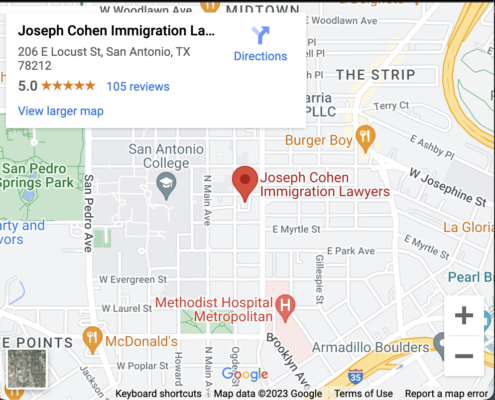San Antonio, Texas Students Not Attending In-Person Classes No Longer Face Deportation
Students on U.S. student visas can rest a little easier about their ability to remain in the country this fall. The Trump administration recently issued a reversal on a policy that would have left many immigrant students facing deportation if their schools didn’t re-open for in-person classes in the fall. However, the Trump administration has recently issued a reversal on the policy. Both MIT and Harvard had sued the Trump administration for issuing the policy. The New York Times reports that just minutes before lawsuits against the administration were to be heard, the Trump administration rescinded its policy. For those foreign students who had questions about their student visas for J. Joseph Cohen, a deportation lawyer in San Antonio, Texas, this is good news.
Prior to the coronavirus pandemic, foreign students were required to take a majority of their classes in-person in order to maintain their student visa status. Then, due to the coronavirus pandemic, these restrictions were relaxed given that many colleges and universities had to shut down to stop the spread of the disease. There had been great uncertainty about whether schools should re-open in the fall and debate about whether re-opening schools would create vectors for disease. The Trump administration, in an effort to get schools to re-open, issued an order that would let students remain in the U.S. as long as they took at least one in-person class. However, as the virus had further spread, with Florida recording record numbers of cases, and other states that re-opened early seeing alarming spikes, many have been discussing whether another shut down might be needed. Earlier this summer, the Trump administration issued an order stating that students who didn’t attend at least one class in person would have to return to their home countries.
Several states joined MIT and Harvard in the lawsuit, calling the policy cruel and unnecessary. Then, several major tech companies signed on to support the lawsuit, claiming that the policy would damage American businesses. If students had to return to their home countries, they could risk losing the opportunity to have a bridge work visa that would have allowed them to work for U.S.-based companies. Foreign students who would have had to go to their home countries under the old policy also would have faced even more challenges. Students returning to countries like China or Japan would have faced the challenge of contenting with a 12-hour time difference in some cases. Other students have family in the U.S. and don’t have any ties to their home countries. They would have faced returning to a country they didn’t know during a major pandemic. Thankfully, foreign students studying in the U.S. no longer face those challenges.
Under the rescinded order, foreign students will be able to remain in the U.S. even if they take online courses. So, the good news is that if you have a student visa and school will take place online in the fall, you can remain in the U.S., won’t face deportation, and will have more options when it comes to planning your educational plans for the fall.
The change comes as a relief for many students who are currently in their home countries making plans to arrive in the U.S. in the fall. There had been reports of officials refusing entry to some students on visas claiming that schools would only be opening online. Fortunately, now students with student visas won’t be facing deportation and can continue their plans to come to the U.S. in the fall. If you have questions about how the coronavirus pandemic is affecting deportation and immigration, consider reaching out to J. Joseph Cohen, a deportation law firm in San Antonio, Texas today.
What Are Colleges and Universities Planning for the Fall?
Different colleges and universities have different plans regarding re-opening. According to the Chronicle of Higher Education, 50% of colleges are planning to hold in-person classes in the fall. Another 34% are planning to implement a hybrid model, with both in-person and remote classes, and another 12% are planning to hold their classes entirely remotely in the fall. The good news is that regardless of your university’s plans, if you are a foreign student on a foreign visa, your school’s plan will no longer impact your ability to remain in the country. The Trump administration’s reversal also creates greater flexibility for schools that are proposing hybrid plans in the fall. Should the outbreak worsen or the need to shut down occur, these schools can now do so without the fear of leaving their foreign students in a tough situation. J. Joseph Cohen is a deportation law firm in San Antonio, Texas that is closely monitoring the situation and can help you if you have questions about how the pandemic might impact your immigration or deportation case. Contact J. Joseph Cohen today or reach out to USAttorneys.com to get matched with our deportation lawyer.






